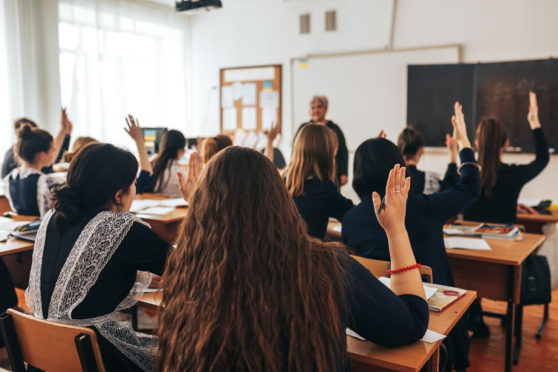
A record number of appeals is expected after Scots pupils get their exam results on Tuesday after examiners rejected many grades suggested by teachers.
Due to the pandemic, this year’s exams were cancelled and teachers were asked to give estimated grades for students, taking into account course work, prelims and assessments.
However, it is understood many teachers’ grades have been marked down by staff from the Scottish Qualifications Authority. The SQA has previously said the results would be “moderated”, based on the school performance history.
Appeals are free for the first time, which experts say is likely to fuel a significant rise in the number of results challenged.Meanwhile, universities have indicated they could lower entry requirements for students who narrowly missed out on a grade.
Last year there were more than 11,500 appeals, of which 14.6% resulted in a grade change and Lindsay Paterson, professor of education policy at Edinburgh University, said he expected far more appeals from Scotland’s 130,000 pupils this month.
He said: “The rules about appeals say any decision about an appeal is up to the school, not individual students or parents. However, it is likely this year that schools will be very sympathetic to requests for appeals because their own reputation will be at stake and because there will be no financial charge to schools.
“Because an appeal requires that the teachers’ estimates have been downgraded by the SQA, then it will be in the school’s interest – as well as in the interest of a student – to have the appeal upheld.
“So it is likely there will be appeals in the vast majority of cases where a student’s grade is less than the school’s estimate.”
Larry Flanagan, general secretary of the EIS teachers’ union, said: “If professional judgment has been overturned and teacher estimates are altered on a significant scale, this may undermine confidence in the results and generate additional workload for teachers in submitting appeals.”
Iain Gray, Scottish Labour’s education spokesperson and former minister for lifelong learning, said: “Thousands of Scots will get their results on Tuesday. Real concerns remain that some will have their teachers’ assessments reduced based on the basis of their school’s previous performance and that would be most unfair. The SQA have steadfastly refused to publish their methodology and that is not good enough. My fear is that on Tuesday the SQA will be drowned with appeals because they will have changed teacher assessment without anyone understanding how or why.”
Scottish Conservative education spokesman Jamie Greene said: “The Education Secretary was warned it would have been better to avoid an onslaught of pupils’ appeals if the SQA had better engaged with teachers who did the original estimates. John Swinney should show leadership on this and ensure the SQA is fully equipped to manage whatever awaits us once results come out.”
Scottish Lib Dem education spokesperson Beatrice Wishart said: “Young people should have been front and centre of this process. If results day is to be followed by a wave of appeals, the Scottish Government and its agencies need to be equipped to support people through that. No learner should be penalised because of a pandemic.”
Meanwhile, universities have indicated they could lower their entry requirements for students.
Universities Scotland said: “Universities from the outset have said they will show flexibility this year, in light of the exceptional circumstances, so it may be that universities are still able to offer places to students who have narrowly missed out on a grade, but who show plenty of potential in other ways to succeed at university.
“The most important message to applicants is, please don’t worry and, if in doubt, contact your first-choice university when you have your grades.”
The Scottish Government said: “The SQA has worked with partners to ensure the certification model is fair to pupils and recognises their hard work. To support fairness, a free appeals process is an integral part of the approach to awarding this year.
“We are content that the SQA has processes and contingency measures in place to support the appeals process.”
The SQA declined to comment on the expected increase in appeals, but said a candidate advice line would be available to students.
It said: “We are providing a free appeals service this year. That means schools and colleges that have questions about a candidate’s final grade can appeal the result, if it is lower than what they estimated.
“They need to have permission from the candidate and sufficient evidence to support the initial estimate. Following an appeal, final grades can be increased, they can be lowered, or they can remain the same.
“If learners have any questions about their results they should speak to their school, college or training provider first.
“If they need to talk to someone about their results certificate, SQA’s Candidate Advice Line is open from 8am on Tuesday.”

Enjoy the convenience of having The Sunday Post delivered as a digital ePaper straight to your smartphone, tablet or computer.
Subscribe for only £5.49 a month and enjoy all the benefits of the printed paper as a digital replica.
Subscribe